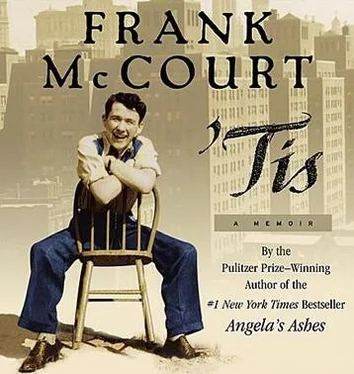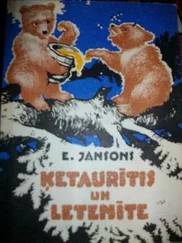Frank McCourt - 'Tis
Здесь есть возможность читать онлайн «Frank McCourt - 'Tis» весь текст электронной книги совершенно бесплатно (целиком полную версию без сокращений). В некоторых случаях можно слушать аудио, скачать через торрент в формате fb2 и присутствует краткое содержание. Жанр: Старинная литература, на английском языке. Описание произведения, (предисловие) а так же отзывы посетителей доступны на портале библиотеки ЛибКат.
- Название:'Tis
- Автор:
- Жанр:
- Год:неизвестен
- ISBN:нет данных
- Рейтинг книги:3 / 5. Голосов: 1
-
Избранное:Добавить в избранное
- Отзывы:
-
Ваша оценка:
- 60
- 1
- 2
- 3
- 4
- 5
'Tis: краткое содержание, описание и аннотация
Предлагаем к чтению аннотацию, описание, краткое содержание или предисловие (зависит от того, что написал сам автор книги «'Tis»). Если вы не нашли необходимую информацию о книге — напишите в комментариях, мы постараемся отыскать её.
'Tis — читать онлайн бесплатно полную книгу (весь текст) целиком
Ниже представлен текст книги, разбитый по страницам. Система сохранения места последней прочитанной страницы, позволяет с удобством читать онлайн бесплатно книгу «'Tis», без необходимости каждый раз заново искать на чём Вы остановились. Поставьте закладку, и сможете в любой момент перейти на страницу, на которой закончили чтение.
Интервал:
Закладка:
We walk to the insurance building and I know I can’t go through that cathedral entrance. I know I’m not cut out for the world of insurance.
Yo, McCourt, come on, it’s late. Puglio will have a shit fit.
I’m not going in.
What?
Not going in.
I walk away down Fourth Avenue.
Yo, McCourt, you crazy, man? You gonna be fired. Shit, man, I gotta go.
I keep going in the bright July sun till I reach Union Square where I sit and wonder what have I done. They say if you quit a job in any big firm or get fired all the other firms are informed and doors are closed to you forever. Blue Cross is a big firm and I might as well give up hope of ever having a big job in any big firm. But it’s a good thing I quit now rather than wait to have the lies on my application form discovered. Mr. Puglio told us that was such a serious offense you’d not only be fired but Blue Cross would demand repayment of the wages paid for the training session and on top of that your name is sent to all the other big firms with a little red flag waving at the top of the page to warn them. That little red flag, said Mr. Puglio, means you’re forever barred from the American corporate system and you might as well move to Russia.
Mr. Puglio loved talking like that and I’m glad I’m away from him, leaving Union Square to stroll down Broadway with all the other New Yorkers who don’t seem to have anything to do. It’s easy to see that some have that little red flag on their names, men with beards and jewelry and women with long hair and sandals who would never be allowed inside the door of the American corporate system.
There are New York places I’m seeing today for the first time, City Hall, the Brooklyn Bridge in the distance, a Protestant church, St. Paul’s, which has the grave of Thomas Addis Emmet, brother of Robert who was hanged for Ireland, and farther down Broadway, Trinity Church, looking the length of Wall Street.
Down where the Staten Island Ferries come and go there’s a bar, the Bean Pot, where I have the appetite for a whole liverwurst sandwich and a stein of beer because my tie is off and my jacket is over the back of a chair and I feel relieved I escaped with the little red flag on my name. There’s something about finishing the liverwurst sandwich that tells me I’ve lost Emer forever. If she ever hears of my troubles with the American corporate system she might shed a tear of pity for me though she’ll be grateful in the long run she settled for the insurance man from the Bronx. She’ll be secure knowing she’s insured for everything, that she can’t take a step that’s not covered by insurance.
It’s a nickel for the Staten Island Ferry and the sight of the Statue of Liberty and Ellis Island reminds me of the morning in October 1949 I sailed into New York on the Irish Oak, past the city and up the river to anchor that night in Poughkeepsie and on the next day to Albany where I took the train back down to New York.
That was nearly four years ago and here I am on the Staten Island Ferry with my tie stuffed in the pocket of the jacket hanging from my shoulder. Here I am without a job in the world, my girlfriend gone, and the little red flag waving on my name. I could go back to the Biltmore Hotel and take up where I left off, cleaning the lobby, scouring toilet bowls, laying carpet, but no, a man who was a corporal can never sink that low again.
Looking at Ellis Island and an old wooden ferry rotting between two buildings makes me think of all the people who passed here before me, before my father and mother, all the people escaping the Famine in Ireland, all the people from all over Europe landing here with their hearts in their mouths for fear they might be caught with diseases and sent back and when you think of that a great moaning moves across the water from Ellis Island and you wonder if the people sent back had to return with their babies to places like Czechoslovakia and Hungary. People who were sent back like that were the saddest people in all of history, worse than people like me who might have bad eyes and the little red flag but are still secure with the American passport.
They won’t let you stay on the ferry when it docks. You have to go inside, pay your nickel and wait for the next ferry and while I’m there I might as well have a beer at the terminal bar. I keep thinking about my mother and father sailing into this harbor over twenty-five years ago and as I sail back and forth on the ferry, six times, having a beer at each end, I keep thinking of the people with diseases who were sent back and that makes me so sad I leave the ferry altogether to call Tom Clifford at Port Warehouses and ask him to meet me at the Bean Pot so that I’ll know how to get home to the small apartment in Queens.
He meets me at the Bean Pot and when I tell him the liverwurst sandwiches here are delicious he says he’s finished with liverwurst, he’s moving on. Then he laughs and tells me I must have had a few, that I’m having trouble getting my tongue around the word liverwurst and I tell him, no, it’s the day I’ve had with Puglio and the Blue Cross and the airless room and the little red flag and the ones who were sent back, the saddest of all.
He doesn’t know what I’m talking about. He tells me my eyes are crossing in my head, put on my jacket, home to Queens and into the bed.
Mr. Campbell Groel takes me back at Port Warehouses and I’m glad to be getting decent wages again, seventy-five dollars a week going up to seventy-seven for operating the forklift truck two days a week. Regular platform work means you’re on your feet in the truck loading pallets with boxes, crates, sacks of fruits and peppers. Working the forklift is easier. You hoist up the loaded pallets, store them inside and wait for the next load. No one minds if you read the paper while you wait but if you read the New York Times they laugh and say, Look at the big intellectual on the forklift.
One of my jobs is to store bags of hot peppers off United Fruit ships in the fumigation room. On a slow day it’s a good place to bring in a beer, read the paper, take a nap and no one seems to mind. Even Mr. Campbell Groel on his way out of the office might look in and smile, Take it easy, men. It’s a hot day.
Horace, the black man, sits on a bag of peppers and reads a paper from Jamaica or he reads a letter over and over from his son who is in university in Canada. When he reads that letter he slaps his thigh and laughs, Oh, mon, oh, mon. The first time I ever heard him talk his accent sounded so Irish I asked him if he was from County Cork and he couldn’t stop laughing. He said, All people from the islands have Irish blood, mon.
Horace and I nearly died together in that fumigation room. The beer and the heat made us so drowsy we fell asleep on the floor till we heard the door slam shut and the gas hissing into the room. We tried to push the door back but it was jammed and the gas was making us sick till Horace climbed up on a mound of pepper sacks, broke a window and called for help. Eddie Lynch was closing up outside and heard us and slid the door back.
You’re two lucky bastards, he said, and he wanted to take us up the street for a few beers to clear our lungs and to celebrate. Horace says, No, mon, I can’t go to that bar.
What the hell you talking about? says Eddie.
Black man not welcome in that bar.
Fuck that for a story, says Eddie.
No, mon, no trouble. There’s another place we have a beer, mon.
I don’t know why Horace has to give in like that. He has a son in university in Canada and he can’t have a beer himself in a New York bar. He tells me I don’t understand, that I’m young and I can’t fight the black man’s fight.
Eddie says, Yeah, you’re right, Horace.
In a few weeks Mr. Campbell Groel says the Port of New York is not what it used to be, business is slow, he has to lay off a few men and, of course, I’m the junior man, the first to go.
Читать дальшеИнтервал:
Закладка:
Похожие книги на «'Tis»
Представляем Вашему вниманию похожие книги на «'Tis» списком для выбора. Мы отобрали схожую по названию и смыслу литературу в надежде предоставить читателям больше вариантов отыскать новые, интересные, ещё непрочитанные произведения.
Обсуждение, отзывы о книге «'Tis» и просто собственные мнения читателей. Оставьте ваши комментарии, напишите, что Вы думаете о произведении, его смысле или главных героях. Укажите что конкретно понравилось, а что нет, и почему Вы так считаете.












